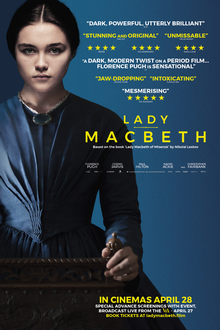This is another low budget, minimalist film, an adaptation of a Russian novella transposed onto 19th-century England. With its lack of a musical score and limited set pieces, it feels very much like a play and it makes for an engrossing character study of its villainous protagonist. This isn’t one my of favorites however as the character’s internal thoughts are deliberately kept as a mystery to the audience and it doesn’t really have much of a theme that personally resonates beyond the horror of her crimes.
Katherine marries into the Lester family and moves into a house she shares with her husband Alexander and her father in law Boris. She soon discovers that her husband no feelings or even any interest in her and her father in law expects to be subservient and quiet while still keeping to the strict schedule in the house. Alexander refuses even to have sex with her or to allow her to walk in the grounds outside. On one occasion when both men are away on business, she enjoys her freedom and one day realizes that the laborers on the land are fooling around with her maid. She scolds them but is attracted to one man, Sebastian, who is particularly forward with her. The next day she approaches him and they become lovers. Eventually her behavior becomes transparent enough enough that everyone notices it. When Boris returns to the house he berates her and beats Sebastian. In return, Katherine calmly poisons his food, leaving her maid so shocked that she loses her voice.
This film tempts you to sympathize with Katherine’s predicament at first but even though I have no familiarity with the novella, it’s not hard to guess which direction it’s going given its title. Katherine’s crimes are so heinous and she is so brazen and unrepentant in committing them that absolutely no one is on her side by the end of the film, whatever one may feel about the lot of women in the male-dominated society of the time. I am guessing that a lot of the appeal of the novella at the time was in the sheer shock value in seeing a woman of good breeding descend to such horrific acts of murder. There is perhaps something too about how women are indeed treated unfairly by society, yet when we abandon all rules and propriety, the end result are evil atrocities. I can’t see these themes having much relevance today and such crimes are certainly no longer shocking in fiction, so this film isn’t one of my favorites.
Another problem is that the setting feels generic and rootless to me. We know that this takes place in England and we have some idea of when it is set in but not much more than that. Theirs seem to be some manner of arranged marriage to explain why Katherine and Alexander are strangers to each other, but are they even from the same social class? What business are the Lesters actually engaged in and does Katherine even have any ability to run the household in the absence of the men? The church pastor comes by to express his concerns to Katherine but she is able to brush him off casually, especially since it seems as if she isn’t really a part of the local community anyway. From what I can tell, the original novella is much more rooted to a specific time and place and I feel this adds a lot to the impact. Transposed to another setting without the appropriate adaptations, this feels purely plot driven without much emotional depth.
The performers here and of course Florence Pugh as Katherine all do an excellent job and it is good to learn about this piece of Russian literature. But I have no particular love for this film itself and I don’t think it has much of value beyond fluffing the resumes of the performers involved.
